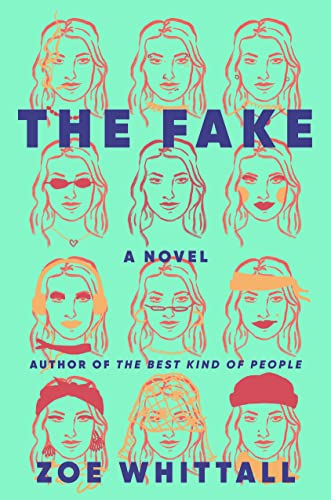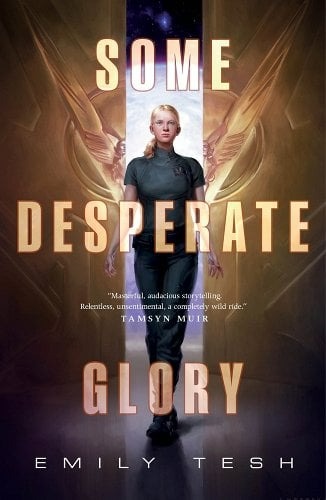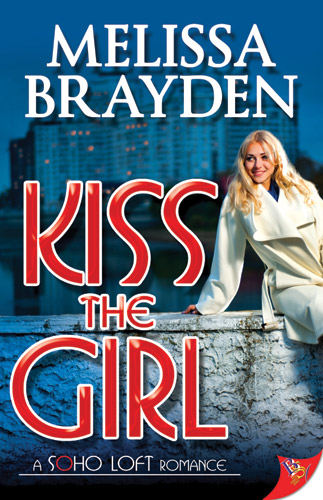I feel very conflicted about this book. When I first heard about it, I was really excited to read it, because it is the first young adult book with a trans girl narrator, plus the main character is a lesbian. There are very few trans lesbian books, so they also get bumped up my reading list. When I heard that the author is cis, I was a little apprehensive, which I always am when reading a book about a minority identity that the author doesn’t share. Then when I initially read it, I was disappointed. Although it was compelling, I had a lot of issues with it, particularly the vocabulary used (which may be regional, but I haven’t heard anyone ever refer to themselves as a “survivor of transsexualism”, and the word “transsexual” itself I very rarely hear), and the ample amount of space given to Emily’s girlfriend’s initial transphobic response to Emily coming out. After that, I Rachel Gold’s second novel, Just Girls, fully expecting to dislike it. Instead, I loved it. I then discovered tons of rave reviews of Being Emily from all over, including many reviews by trans women themselves, and found out that there were many trans women beta readers who worked with Rachel Gold in shaping Being Emily. As a cisgender person, I obviously make no claim to the authenticity of a depiction of the experience of being trans.
So, I feel muddled about Being Emily. (Much more so now, because I put off reviewing Being Emily due to my ambivalence about it, and then discovered that my glitchy Kobo had helpfully erased all of my extensive highlighting and notes that I took while reading it.) Although I absolutely give precedence to trans women’s reviews of this book, I’ll share my experience with it anyways, in case it’s helpful to anyone.
One of the first things that struck me about the novel was that I wasn’t sure who it was aimed at. Almost half of the book is from the perspective of Claire, Emily’s girlfriend, who at first reacts pretty badly to Emily’s coming out. We read pages of her transphobic tirades complete with religious justification and sketchy ideas of biological truths before she comes around. This may be accurate to many people’s experience, but I cringed reading it, and I can’t imagine slogging through that as someone coming to terms with their own gender identity.
It’s also quite bleak, and again, though it may be realistic for many people for their parents to react badly and for the coming out process to be negative, as a personal preference that’s not the world I want to escape to in a book. Again, this is completely personal, but I have long ago gotten tired of reading lesbian YA that is focused on how awful it is to come out. And maybe it’s unfair to bring that into reading a trans narrative, where there are so few stories at the moment, and where the reality is bleaker than the average cis lesbian experience.
Another element that I personally didn’t enjoy was Claire’s Christianity being focused on quite a bit in her sections. One detail I did enjoy was the freedom that Emily experiences in gaming/the internet, especially World of Warcraft. This is explored more in Just Girls, and I liked it even more there.
I learned from the author that Being Emily was first drafted ten years ago, which explains some of the outdated terms. I’m still not sure how to think about this one. Although I’ve lost all my notes, I remember highlighting many of Claire’s passages, being horrified at her callousness, and questioning some other lines for not seeming realistic to how I’ve heard trans people present themselves, but at the same time, I’ve read multiple trans women’s positive reviews of this title, and no negative reviews by trans people, so I have to chalk it up to my own preferences at least in part. I did absolutely love Just Girls, though, and recommend that one wholeheartedly.





veesignorelli says
Ahaha, I’m kind of amused that we both published reviews of this book within days of each other (http://www.gayya.org/?p=1391). I really enjoyed your thoughts.
I talk a little bit about this in my own review, but as a nonbinary teen who was coming to terms with my own gender identity at the same time as I was reading this… well, I loved it. I even liked Claire’s parts because, as a nonbinary person who thought that I was cis, I’d 1) had many of her thoughts and 2) was starting to come up against those thoughts in other people as I started expressing myself. So… there was just something cool about seeing it on the page, especially since it was definitely identified as problematic. Because, like… sometimes you don’t realize how problematic those things are? Like you just totally normalize them. And seeing them in a work of fiction that displays them unabashedly but obviously in a negative light really helps you see how damaging they’ve been.
I definitely agree that it’s not a good novel for escapism– Just Girls lends itself much more to that. Being Emily I think is much more about seeing an honest experience reflected… though I really didn’t find it that depressing/angsty/etc. I found it hard but also very happy and joyful.
And I definitely agree about the language thing! didn’t even mention that in my review, as I’d pretty much forgotten about it. But I’m pretty willing to forgive that… especially in the context of Luna being recommended as trans lit over, well *everything* else, but I think specifically Being Emily. And I’d much rather have a little outdated language then, well, Luna. 😛
/thought-dump
Danika @ The Lesbrary says
That is funny, especially since I read it two months or so ago and for some reason only wrote the review now.
That makes total sense. I felt a little conflicted about posting a review at all, because as a cis person, it doesn’t really matter what I thought of the book? But at the same time, it seems silly not to review it when I review every other queer women book I read (hence the 2 month gap). I’m glad I have gotten to read trans people’s reviews of Being Emily, because it’s really interesting to see it from different perspectives and see how my own experience colours it.
Honestly, I’m just impatient for there to be so much more trans lit out there! I’ve been immediately picking up every queer trans women book that I hear about, but I can still count them on one hand.
I haven’t read Luna myself, but from what I’ve heard, I can definitely understand the irritation of it being the go to trans book recommendation. I think Julie Anne Peters’s early books were important as paving the way for the queer books we have now, but they’re pretty cringe worthy in comparison to more recent books.
How much did you love Just Girls, though? I also appreciated that one of the main characters is bi, after that questionable line in Being Emily.